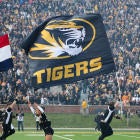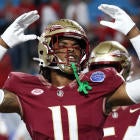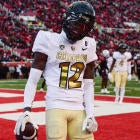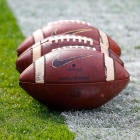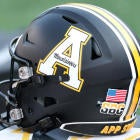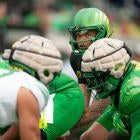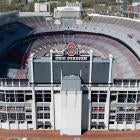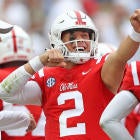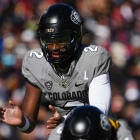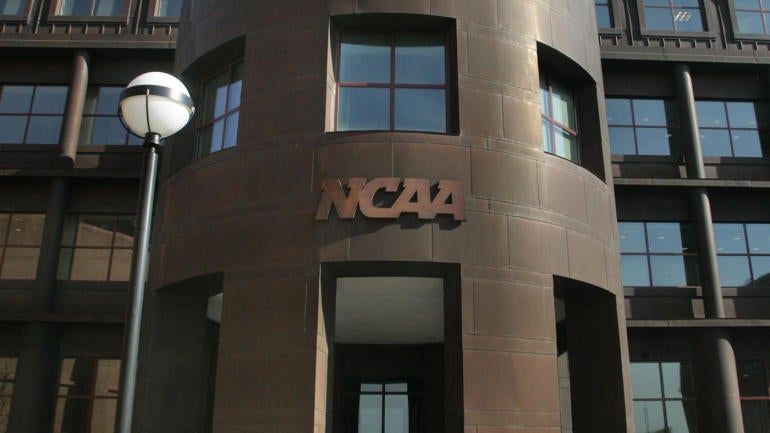
John Ruiz did not threaten to sue Monday night. That in itself was breaking news. The billionaire University of Miami alumnus who has largely become the face of name, image and likeness extravagance was at peace when the NCAA at least put a stake in the ground by creating an actionable NIL policy.
The likes of Ruiz are under review and may be considered boosters. While he does not run a collective, he does support the university and is paying athletes for NIL sponsorships through LifeWallet and his Cigarette Racing Team. That may be in violation of the NCAA's new guidelines, which do not allow people with the booster label within sniffing distance of a moldy jock at Good Ol' State U.
Ruiz does not feel threatened. He sees his enterprise not only above the fray but as a leader in the burgeoning industry.
"To me, it's business as usual," he told CBS Sports after learning the details of the NCAA's long-awaited NIL guidelines. "I was navigating directly with the rules."
Ruiz added: "The term booster is irrelevant in my view because, if you have a legitimate business, it doesn't matter if you are a booster or not. The deal is an arms-length transaction."
The NCAA may disagree.
"NCAA recruiting rules preclude boosters from recruiting and/or providing benefits to prospective student-athletes," the NCAA Board of Directors outlined in a press release that looked like it had been combed over by lawyers.
In fact, that's exactly what happened. But the membership wanted Big Brother to say something, even if it was enforcing its own rules 10 months too late.
Whatever the case, a calm settled over the land a bit Monday when the board issued those NIL guidelines. The NCAA was typically reactive, but at least a landscape that had become clouded was able to be cleared a bit.
One coach compared the current situation to a couple of his favorite Paramount shows, "Yellowstone" and "1883."
"[Men who settled the West] could have attacked and pillaged women and robbed people and not gone to jail," that coach said. "But you don't. It's an ethical thing. You don't. That's what is bothering me the most.
"Just because you can [cheat] doesn't mean you should."
People like Ruiz are clearly in the crosshairs -- at least for a review. A booster is generally defined by the NCAA as a representative of a university's athletic interests.
On Monday, "collectives" and their representatives were added to the booster categorization.
At their worst, collectives have become booster-fueled, money-laundering operations for both high school recruits and valued transfers. At their best, well, try to convince critics of anything other than that definition.
Ruiz's actions have been at the forefront. He is spending at least $550,000 this year on deals with Miami football players. NIL pioneers Hanna and Haley Cavinder transferred from Fresno State to Miami seeking further off-court riches. Kansas State guard Nijel Pack found the same in one of the most publicized deals of the NIL era. The transfer recently got a two-year deal from Ruiz worth $800,000 as he made his way to Miami.
"I never saw Nijel Pack play or knew what his abilities were when I entered into the contract," Ruiz said. "The reason I entered into the contract was because he was sort of the top-rated portal player by all accounts."
Pack's deal led to current Canes basketball player Isaiah Wong threatening to enter the transfer portal himself if his NIL compensation was not increased. Ruiz refused. Wong is currently in the NBA Draft process.
"I would never do that," Ruiz said. "No. 1, that could be viewed as pay-for-play. On top of that, I don't renegotiate with anybody."
Monday's release was clearly a warning shot fired at boosters who would have such influence.
That doesn't mean Ruiz is violating rules. He says he turns over every contract to Miami compliance. But if nothing else, the NCAA put everyone on notice.
While the association included language about retroactively investigating egregious booster violations from July 1, 2021, to May 9, when the guidelines were released, attorney Tom Mars said "retroactive legislation in a democracy is never a good idea."
So, at least the ground rules have been set for the future: Boosters, in general, are bad.
The NCAA board added: "It appears that the overall mission of many, if not all" of the collectives is to make offers to recruits as well as existing athletes "thereby triggering the definition of a booster."
If that's the case, NCAA enforcement has a giant job ahead of it. It's one thing to condemn boosters; it's another to get the enforcement mobile out of the garage and start investigating wrongdoers. Gentlemen, start your Priuses -- or whatever NCAA investigators drive.
Otherwise, Monday's news isn't worth the short press release.
"You cannot have a collective contract without contact [with an athlete]," said Blake Lawerence, CEO of Opendorse, an industry leader in developing NIL opportunities. "That is the world we live in. If one of those parties is a booster and the other is a prospective student-athlete, a violation has occurred."
Dozens of collectives have sprung up since NIL started 10 months ago. Assuming most of them are providing illicit benefits to recruits -- as the NCAA seems to assert -- that might mean there is perhaps too wrongdoing for the NCAA to investigate. The association's enforcement staff is currently down 20 bodies due to a variety of reasons.
"I'm proud of the NCAA today," Lawrence said. "Somebody has to be the record keeper. I think it is going to curb some behavior in the market."
"One or more [boosters] may sue the NCAA," Mars added, "which is a costly endeavor to say the least. But in the end, I think the NCAA would prevail in such litigation."
At least one member of the working group who advised the board, Ohio State athletic director Gene Smith, said he was satisfied that the NCAA incorporated all of that group's recommendations.
"It's a good start," texted Colorado AD Rick George, another member of the working group.
The most the NCAA can do to boosters is disassociate them from a school. Boosters are not compelled to cooperate with NCAA investigations. However, "disassociate" means those boosters could not have any contact with a school's athletic interests in any way.
Years ago, a dissociated Ole Miss booster wanted to sue the NCAA. Mars, a famous NCAA antagonist, refused.
"It's hard to imagine that ego-driven boosters, who are willing to spend large sums of money on their favorite school's athletic program, are going to keep investing at that level once they're stripped of their status in the school's athletic program," Mars said.
Does Ruiz qualify as a rogue booster? Do any of his peers? Before answering, consider Ruiz says all of his clients have to perform quid pro quo duties for his companies -- typically social media posts and promotional videos. Ruiz also says the news of players like Pack making big-money deals is promotion of his brands on its own.
"Forgetting how good or bad a player ends up being -- that doesn't carry the day for me," Ruiz said. "Nevertheless, you can market that particular engagement."
As for lawsuits, expect some sort of legal challenge from some aggrieved booster. NIL is way too established at this point, and too many powerful people are involved, for that not to be the case.
Any hint at limiting college athlete compensation these days smacks of an antitrust violation. Yes, the NCAA is to blame for letting all of this get that far.
"If you're a lawyer and you're practicing in college sports, Katy bar the door," Mars said. "It's a free for all. Anybody can sue anybody. The law is completely unsettled [in this area]. If those boosters want to spend a gazillion dollars, more power to them."













